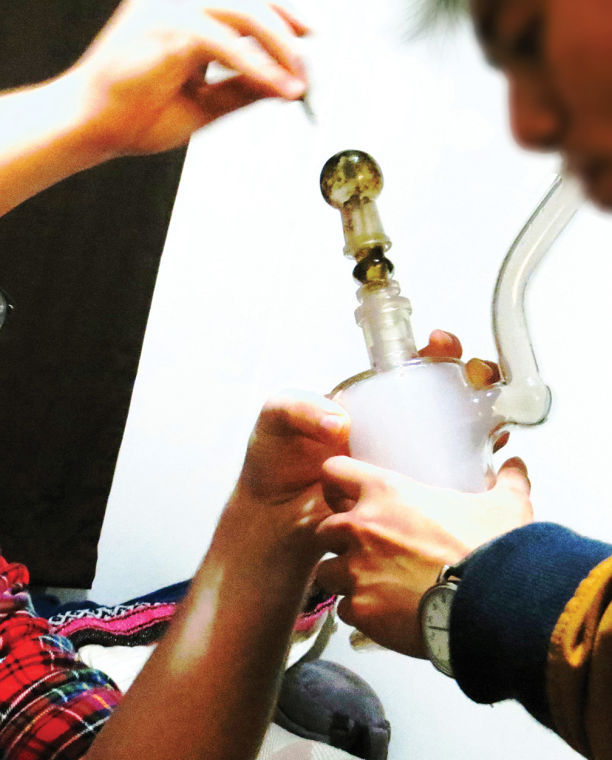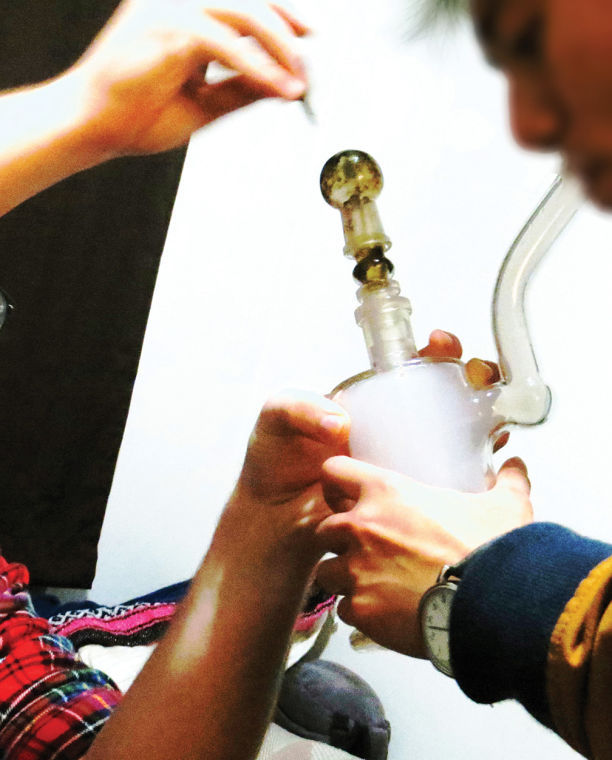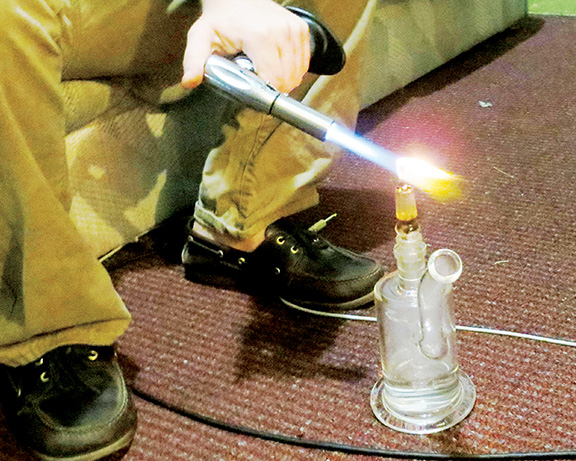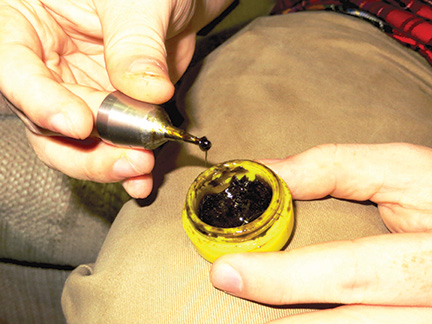EDITOR’S NOTE: Because this article discusses the use of illicit substances, some names have been changed to protect privacy.
Empty D.P. Dough delivery boxes and crumpled Taco Bell wrappers lay strewn across the floor of the fraternity’s satellite house. The electronic beats of Super Smash Bros. provided background music as one student pulled out a blowtorch.
“Hey, try this,” he said to another student.
Will, a freshman who was considering pledging the fraternity, put his mouth to the glass pipe and inhaled.
“I love everything about weed,” said Will, a psychology major. “So why not this?”
Butane hash oil, a mix of cannabinoids extracted from a marijuana plant and blasted with butane, has been smoked on the West Coast for decades. But recently, the drug, often known as “dabs,” has gained popularity in this state and the region.
A single dab of the oil can contain up to 90 percent THC, compared to strong strains of marijuana that contain an average of 25 percent, said John Hall, a detective sergeant with the Maryland State Police. Because of its potency, Hall calls the drug “the crack of marijuana.”
Its presence is evident among university students: Will said he was invited to dab at four different fraternities this semester.
“This summer is when it became incredibly popular here,” said Edward, a junior communication major who said he dabs at least once a day. “I am someone who smokes a lot, but I never had dabbing available to me until this summer.”
Edward, who is on his fraternity’s executive board, said dabbing is most prevalent among upperclassmen because they typically live off the campus or in fraternity houses where students don’t have to hide the equipment from resident assistants.
“Everyone I know that smokes weed has tried dabbing at least once,” he said. “We can find it if we want it, and we have a spot where we can do it. The blowtorch would be hard to have in a dorm.”
Last Wednesday, Edward used a blowtorch to heat the top of a glass “oil-rig” pipe for about 10 seconds until it glowed. He used a nail-like metal object to pick up a small “dab” of the concentrated hash oil — which has the consistency of cold honey — and touched it to the hot glass.
He then inhaled the vaporized hash oil through the glass smoking device and felt an instantaneous high.
“It’s like an adrenaline rush; it hits you really quick,” Edward said. “You feel it immediately. I just enjoy sitting here on this couch more.”
The hit is harsher — and better — than anything Will said he’s smoked before.
“It’s such a better high,” Will said. “Once you’ve done it, you know you’d rather do dabs than smoke a joint. It feels at least three times more intense than a bong.”
For people who aren’t frequent smokers, the intensity can be overwhelming — the Fredericksburg Patch reported an increase in hospitalizations because of cannabis overdoses.
“The high levels of THC will cause your body to shut down,” Hall said. “Your body just can’t regulate that much THC.”
Will said he can handle the effects because he has a high tolerance level — he smokes marijuana about five times a week. But his friend is a more casual smoker and passed out after dabbing for the first time. Will had to carry him back to his dorm.
But the potential danger doesn’t lie only in the drug itself. Butane, the substance used to extract the oil from the marijuana plant, is a highly flammable gas.
Since Sept. 29, three explosions have occurred in makeshift hash oil labs in Santa Cruz, Calif., one of the states where dabbing has been popular for longer than compared to this state. An Oct. 9 blast left a 29-year-old man with burns on about 40 percent of his body, according to the Santa Cruz Sentinel. And in 2012, a man died in a Livermore, Calif., hash oil explosion, the San Francisco Chronicle reported.
Edward said he isn’t aware of anyone in College Park who makes his or her own BHO. Instead, he and his friends buy it in Baltimore or Washington. He used to order it from California through Silk Road, an online drug marketplace, before the FBI shut it down Oct. 1.
There have been no incidents involving BHO on this university’s campus, and University Police officers are not very familiar with dabbing, University Police spokeswoman Sgt. Rosanne Hoaas said.
In other parts of the state, though, state police have seized hash oil on the highway; they stopped a car along 1-95 in Cecil County this summer, according to the Towson Patch.
“We haven’t seen a whole lot of it, but college kids are always the ones who are up on the cutting-edge stuff,” Hall said.
Despite officials’ growing knowledge of the drug, Edward said he isn’t worried.
“People in law enforcement are starting to be more aware of it and trying to stop it, but they’re doing just as good a job with that as everything else,” Edward said.
For some students who smoke marijuana frequently, simply achieving a normal level of high isn’t enough anymore — BHO takes them back to the feeling they had when they first started smoking.
“I can get to a higher high now,” Will said.
A university student uses a metal nail-like object to pick up a small “dab” of concentrated hash oil, and then touches it to a hot glass pipe. When he inhales the vaporized butane hash oil, he said he feels an almost instant high.
A student uses a blowtorch to heat the top of a glass “oil-rig” pipe for about 10 seconds until it glows.
A student uses a metal nail-like object to pick up a small “dab” of concentrated hash oil — which has the consistency of cold honey. Smoking butane hash oil gives an almost instant high, the student said.






